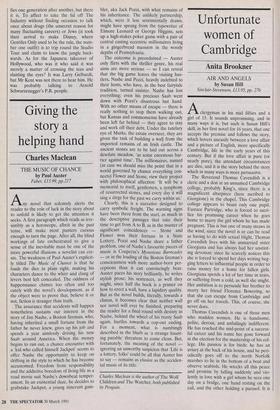Giving the story a helping hand
Charles Maclean
THE MUSIC OF CHANCE by Paul Auster Faber, £13.99, pp.217 Any novel that solemnly alerts the reader to the role of luck in the story about to unfold is likely to get the attention it seeks. A first paragraph which reads as irre- sistibly as a horoscope, albeit in the past tense, will make most punters curious enough to turn the page. After all, the blind workings of fate orchestrated to give a sense of the inevitable must be one of the more powerful illusions a novelist can cre- ate. The weakness of Paul Auster's explicit- ly titled The Music of Chance is that he loads the dice in plain sight, making his characters dance to the whirr and clang of levers best left concealed. The oddness of happenstance chimes too often and too cutely with the novel's development, as if the object were to prove that, believe it or not, fiction is stranger than truth. The assurance that accidents will happen nonetheless sustains our interest in the story of Jim Nashe, a Boston fireman, who, having inherited a small fortune from the father he never knew, gives up his job and spends a year aimlessly driving his new Saab around America. When the money begins to run out, a chance encounter with a 'kid who called himself Jackpot' seems to offer Nashe the opportunity to keep on drifting in the style to which he has become accustomed. Freedom from responsibility and the addictive boredom of living life as a road movie suit Nashe's downbeat temper- ament. In an existential daze, he decides to grubstake Jackpot, a young itinerant gam-
bier, aka Jack Pozzi, with what remains of his inheritance. The unlikely partnership, which, were it less sentimentally drawn, might have sprung from the typewriter of Elmore Leonard or George Higgins, sets up a high-stakes poker game with a pair of central casting eccentric millionaires living in a gingerbread mansion in the woody depths of Pennsylvania.
The outcome is preordained — Auster only flirts with the thriller genre, his real aims are more serious — so I can reveal that the big game leaves the visiting hus- tlers, Nashe and Pozzi, heavily indebted to their hosts, who have, in the best fairytale tradition, turned sinister. Nashe has lost everything; even his precious Saab went down with Pozzi's disastrous last hand. With no other means of escape — there is really nothing to stop them walking out, but Kansas and commonsense have already been left far behind — they agree to stay and work off their debt. Under the tutelary eye of Murks, the estate overseer, they are given the task of building a wall from the imported remains of an Irish castle. The ancient stones are to be laid out across a desolate meadow, 'as some enormous bar- rier against time'. The millionaires, named (in case we should miss the point that in a world governed by chance everything con- nects) Flower and Stone, view their project with philosophical affection: `It will be a memorial to itself, gentlemen, a symphony of resurrected stones, and every day it will sing a dirge for the past we carry within us.'
Clearly, this is a narrative designed to carry symbolic freight. The warning signs have been there from the start, as much in the descriptive passages that take their time to get from A to B, as in the muster of significant coincidences — Stone and Flower won their fortune in a State Lottery, Pozzi and Nashe share a father problem, one of Nashe's favourite pieces of music is Couperin's Mysterious Barricades — or in the loading of the Boston fireman's consciousness with more author-born per- ceptions than it can convincingly bear. Auster paces his story brilliantly, he writes stylish prose; his sentences, as well they might, since half the book is a primer on how to erect a wall, have a lapidary quality. But as the novel builds, literally, towards a climax, it becomes clear that neither wall nor novel will ever be finished, preparing the reader for a final round with destiny as Nashe, behind the wheel of his trusty Saab again, hurtles towards a cop-out ending. For a moment, what is numbingly described in the blurb as `a strange haunt- ing parable' threatens to come clean. But, fortunately, the meaning of the novel ignoring an unworthy suspicion that 'Life is a lottery, folks' could be all that Auster has to say — remains as elusive as the acciden- tal music of its title.
Charles Maclean is the author of The Wolf Children and The Watcher, both published by Penguin.


















































 Previous page
Previous page